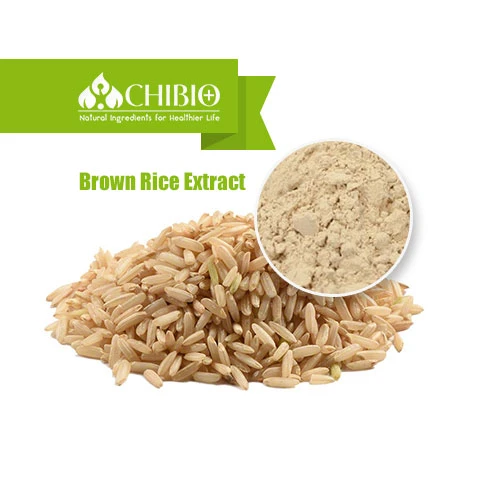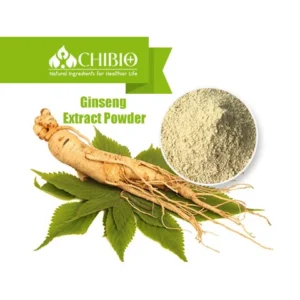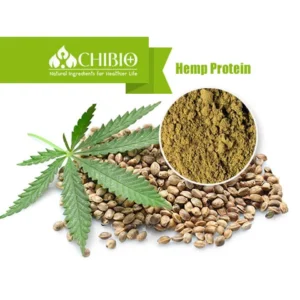Brown Rice Extract
Product Details

Introduction of Rice Protein
Most of us think of rice as a food rich in carbohydrates. However, rice also contains a considerable amount of vegan, gluten-free protein. Surprisingly, right? Rice protein is typically made by treating brown rice with select enzymes that cause the carbohydrates and protein to separate. The protein can be isolated, resulting in a high quality, plant-based protein powder.
Brown rice protein works as an excellent alternative to whey protein for those individuals with dietary restrictions, allergies, sensitivities, or simply those who prefer a vegan or plant-based source of protein. In fact, brown rice contains 37% of the total protein and essential amino acids.
Rice protein is a vegetarian protein isolate that is an alternative to the more common whey and soy protein isolates. Brown rice can be treated with enzymes that will cause carbohydrates to separate from proteins. The resulting protein powder is then sometimes flavored or added to smoothies or health shakes.
Rice protein powder has a more distinct taste than most other forms of protein powder. Like whey hydrolysate, this flavor is not effectively masked by most flavorings; however, the taste of rice protein is usually considered to be less unpleasant than the bitter taste of whey hydrolysate. This unique rice protein flavor may even be preferred to artificial flavorings by consumers of rice protein.
Rice protein is commonly mixed with pea protein powder. Rice protein is high in the sulfur-containing amino acids, cysteine and methionine, but low in lysine. Pea protein, on the other hand, is low in cysteine and methionine but high in lysine. Thus, the combination of rice and pea protein offer a superior amino acid profile that is comparable to dairy or egg proteins, but without the potential for allergies or intestinal issues that some users have with these proteins. Moreover, the light, fluffy texture of pea protein tends to smooth out the strong, chalky flavor of rice protein.
Components & Values of Rice Protein
Rice protein is mainly composed of four proteins: albumin, globulin, alcohol-soluble protein and gluten. The rice slag is mainly endosperm protein, which is composed of albumin (4%-9%) and salt-soluble globulin (10%~11). %), alcohol-soluble gluten (3%) and alkali-soluble gluten (66% to 78%).
In cereal proteins, the protein price (B.V.) and protein price (P.V.) of rice protein are higher than other proteins. The amino acid composition of rice protein has a reasonable balance and high amino acid content, which is unmatched by other plant proteins. Rice protein is recognized as a premium food protein and meets the ideal model recommended by WHO/FAO. Rice protein has a high bio-price and high nutritional value, which is comparable to eggs, milk and beef. In addition, rice protein is a low antigenic protein and does not produce an allergic reaction, which is very advantageous for the production of infant food. Rice protein not only has unique nutritional functions, but also other health functions. Recent studies have shown that rice protein can lower serum cholesterol levels.
Rice, rice grains, rice bran and other raw materials can be used to prepare rice protein. Around rice protein development and utilization, researchers have proposed various preparation methods, including solvent extraction, enzymatic extraction, alkali extraction, acid extraction, and physics. Extraction and composite extraction methods.
Specification of Rice Protein:

|
PRODUCT NAME |
Organic Brown Rice Protein |
|
APPEARANCE |
Off-white Yellow Brown powder |
|
TASTE & ODOR |
Characteristic |
|
PARTICLE SIZE |
95% pass100mesh,300mesh,500mesh |
|
PROTIEN(DRY BASISI)(NX6.25)% |
≥80% |
|
MOISTURE (%) |
≤ 10 |
|
PH (% in water) |
5.5-6.2 |
|
ASH (%) |
≤8.0 |
|
GLUTEN |
<20ppm |
|
SOY ALLERGEN |
<20ppm |
|
MELAMINE |
Not detected |
|
HEAVY METAL |
Pb<0.5mg/kg As<.0.2 mg/kg Cd<0.2 mg/kg Hg<0.2 mg/kg |
Benefits & Applications of Rice Protein:

There are many options out there to help us get extra protein. Whey, soy, pea, and rice are the more popular forms, but you will also find egg, hempseed, amaranth, chia, and even cranberry protein powders. Brown rice protein powder has a mountain of health and fitness benefits, several that it does not share with the others.
1.Hypo-Allergenic
This is perhaps the biggest selling point for rice protein powder. It doesn’t contain the allergens that are typically found in whey and soy. Many individuals have allergic reactions from or intolerances to egg, dairy products like whey, and the estrogen-like compounds in soy. Brown rice allergies are extremely rare, making this protein powder perfect for just about anyone interested in improving their fitness level.
2.Vegetarian and Vegan
Brown rice protein is completely vegetarian and vegan. Many people interested in health and fitness, even non-vegans and non-vegetarians, strive to avoid animal products due to the allergens, concentration of toxins, unnecessary calories, and additional processing. Brown rice is low on the food chain and not highly processed like whey.
3.Digestibility
Brown rice is easily digested and the protein is highly bioavailable and absorbable. Whey can cause bloating, gas, cramping, and digestive discomfort while rice protein makes for a much more pleasant experience without these digestive issues.
4.Texture and Flavor
Rice protein is less chalky when compared to whey and less gritty when compared to soy and pea. The flavor is smoother, more familiar, and more pleasant than soy, whey, and pea for many people. The texture and flavor of rice also melds well with other protein powders when combined in blends.
5.Muscle Growth and Recovery

Our muscles need plenty of protein to build and repair muscle tissue after workouts, and our protein demands climb as we exercise harder and more often. Rice protein powder is a complete protein, containing all the essential amino acids our bodies require.
6.Fat Burning

Protein takes energy to break down and put to use. Protein rich foods like brown rice protein powder create a thermic effect where the body creates heat and burns more calories for hours after eating. Lean protein helps us more effectively manage our weight and lose unwanted fat.
7.Normalize blood Sugar

Dietary protein has another important affect on your weight loss efforts. Blood sugar will spike in response to meals thereby causing the pancreas to secrete the hormone insulin to facilitate the storage of circulating nutrients. Large insulin spikes that result from high carbohydrate-containing meals trigger fat storage and may lead to insulin resistance according to “The Fat Burning Bible” by Mackie Shilstone. Taking in more protein with a meal helps balance this blood sugar and insulin effect to prevent body fat storage.







